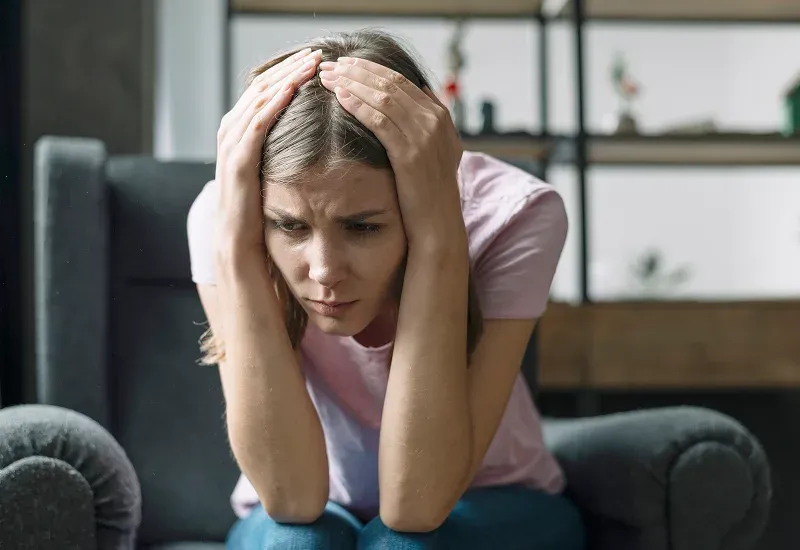Mental Health in Women: Coping with Anxiety and Depression

by Dr. W. Rizvi
6 Aug 2025

Understanding Mental Health in Women
Mental health is about how we feel, think, and act—it's tied to every part of our well-being, including biological, emotional, psychological, social, and environmental factors. Mental health illnesses have been increasing worldwide. The prevalence of mental illness is more significant among females than males. According to research, one in 5 women experience a common mental health disorder. For women, mental health is particularly complicated, with different challenges that affect them at various stages in life. It's just as important as physical health, and like physical health, mental well-being impacts us all, regardless of age. However, women face specific pressures that can take a toll on their mental health, and recognizing these pressures is essential for helping women lead healthier, more balanced lives.

What Affects Women's Mental Health?
- Hormonal Struggles: The most significant factor which is impacting women's mental health is hormonal changes. Throughout life, women go through various stages—menstruation, pregnancy, menopause—that can affect mood, energy, and mental clarity. A few conditions, like polycystic ovary syndrome or endometriosis, can also bring about chronic pain and hormonal imbalances that make managing mental health harder.
- Societal Pressures: Social expectations and pressure can put a lot of pressure on women; it can be the pressure of fitting into a certain standard of beauty, balancing a career and family life, or meeting specific societal roles; these expectations can cause severe stress. Gender inequality, discrimination in the workplace or at home, and other societal barriers only add to this strain, leaving many women feeling anxious, depressed, or powerless.
Sadly, women are more likely than men to face domestic violence or sexual abuse, which can result in long-lasting mental health issues, including anxiety, PTSD, and depression.
In addition to all of this, many women take on caregiving roles for children, elderly parents, or ill partners, leading to what's known as "caregiver burnout." This burnout can make women feel overwhelmed and contribute to chronic stress, anxiety, and depression.

- Pressures of the Beauty Industry: Many women face unrealistic beauty standards due to the influence of the internet and social media in their daily lives. This often negatively impacts their self-esteem and can lead to eating disorders and body image issues. Additionally, for women from marginalized communities— especially women of color—economic disparities and social injustices can add even more strain, further impacting their mental health. It's also common for women to experience both anxiety and depression at the same time, with one condition often making the other worse. Anxiety can wear you down mentally and physically, leading to hopelessness or even depression. Depression, in turn, can worsen anxiety by feeding negative thoughts.
- Parenting & Perinatal Depression: Parenting can also be affected by mental health struggles. For new mothers, postpartum depression can make bonding with a baby or managing the challenges of parenthood more difficult. Perinatal Depression is a medical condition that can affect any pregnant or postpartum woman, and the woman is not to blame for such a condition. There are several treatments available for such a condition, such as Psychotherapies and Medications, both of which need to be supervised by a healthcare professional.
- Gender Discrimination in the Workplace: For women, mental health struggles at work can make it harder to focus, be productive, and balance work with family responsibilities. On top of that, women may face additional stress due to workplace discrimination, unequal pay, and fewer leadership opportunities. These obstacles can have a direct impact on women's well-being.
Effective & Scientifically Proven Ways to Improve Mental Health
There are several initiatives or routines women can attain to improve their mental health and well-being:
- Exercise: Moving your body, whether through yoga, walking, dancing, or running, is one of the most effective ways to fight anxiety and depression. Physical activity boosts endorphins—those "feel-good" chemicals in the brain—that naturally help to relieve stress.
- Nutrition: What you eat has a significant impact on your mental health. A well-balanced diet with nutrients like omega-3 fatty acids, B vitamins, and magnesium can improve mood and help your brain function better.
- Sleep: Getting good sleep is crucial because sleep routines can lead to irritability, stress, and mood swings. Creating a calming bedtime routine, cutting down on using screens before bed, and setting a consistent sleep routine can make a huge difference.
- Mindfulness: Practices like meditation, deep breathing exercises, or even yoga can help to quiet the mind and manage stress. These activities allow you to relax and stay centered when things feel overwhelming.
- Boundaries: Women must know that learning to say “no” and set healthy boundaries is key to mental well-being. Whether it's work, family, or social obligations, taking time for yourself and prioritizing your own needs can reduce stress and guil
Role of Developing Long Lasting Routine in Improving Mental Health
Engaging in routine activities supports mental health, providing a lot of benefits for emotional well-being. These hobbies offer a valuable way to get rid of stress, improve mood, and increase self-esteem through a sense of achievement. Hobbies, whether through reading, physical exercise, or creative pursuits, are powerful tools for staying present, significantly reducing anxiety, and enhancing mindfulness. They also foster social interaction, creating meaningful connections that effectively combat feelings of isolation. Embracing hobbies enriches our lives and strengthens our well-being. By taking on and maintaining hobbies as a regular part of daily life, individuals can find joy, purpose, and relaxation, all of which are essential for maintaining mental health.

“You are capable of creating a life filled with purpose and meaning, despite your mental health challenges.”
The Role of Support Systems
Having a solid support system is essential when dealing with mental health issues. Whether it's family, friends, or support groups, being able to talk to someone who understands can make all the difference. If you're seeking professional help, it can be helpful to have loved ones involved so they can offer emotional support to women during the treatment process.
Emotional well-being includes how much one feels positive and passionate about one's self and life. Having the ability to understand your own emotions and finding healthy outlets for those feelings helps you to cope with daily issues. Finding good friends to confide in, exercising, writing our feelings down, and talking to therapists are all healthy ways of recognizing and coping with your emotions.
When it comes to relationships, mental health struggles can strain connections with partners, family members, or friends. Women with mental health issues may feel misunderstood or isolated, which can make it harder to seek help. It's essential to have healthy communication and emotional support to work through these challenges.
Mental health also impacts physical health. Chronic stress, anxiety, or depression can increase the risk of heart disease and digestive problems and even disrupt sleep. When mental health issues go untreated, they can definitely adversely affect your overall physical well-being.
Conclusion:
To sum up, we can say that Women's mental health is a complex issue that deserves more attention. Women have many strengths, and their main issues are not internal, personal deficiencies. Instead, the problems are primarily societal ones: women's empowerment, social awareness, and the indoctrination of a value system through community participation. By understanding the unique pressures women face and breaking down barriers to treatment, we can create supportive environments that help women thrive.
Mental health issues like anxiety and depression strongly affect women more than men, however with the proper support, guidance, and treatment, including self-care strategies, they can lead fulfilling and healthy lives. It's essential to continue to raise awareness, break the stigma, and encourage women to prioritize their mental health without guilt or shame.
Contact your Endocrinologist today, Dr. W. Rizvi at R-endocrinology, to learn more about Mental Health in Women and Coping with Anxiety and Depression.
Resource:
The Modern Approach to Obesity Treatment: Personalized and Convenient Solutions
Share This:
Disclaimer
*Please note that the information provided in the blogs and articles is intended for general informational purposes only and should not be considered medical advice. We strive to bring you the latest information about the endocrine world; however, we encourage you to seek individual medical advice and treatment options during your consultation with a qualified healthcare professional. *
